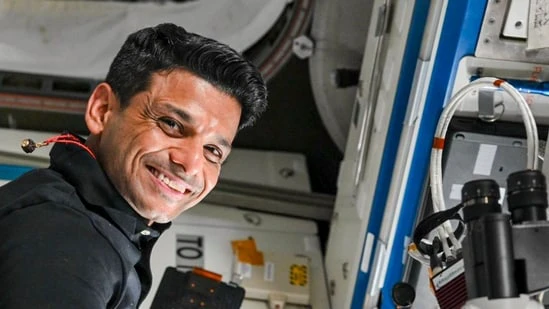The European Space Agency (ESA) has suggested that the Axiom-4 (Ax-4) mission crew currently on board the International Space Station (ISS) will not return to earth before July 14. This makes the AX-4 mission, comprising mission commander Peggy Whitson, mission pilot Group Captain Shubhanshu Shukla, and mission specialists Sławosz Uznański-Wiśniewski and Tibor Kapu, extend their stay on the lower orbit laboratory beyond the stipulated 14 days.
There was no public confirmation from Isro on the return date.
While the Falcon rocket with the SpaceX Dragon spacecraft capsule Grace lifted off to space on June 25, it docked with the ISS after 28 hours on June 26.
India’s Shubhanshu Shukla turns space farmer, grows methi and moong seeds on ISS
Given that the crew started their scientific investigations from June 27, 14 days will end on July 10. With ESA indicating July 14 as the earliest date for their return, the space agency in a media advisory said the return of ESA project astronaut Sławosz Uznański-Wiśniewski will take place not earlier than 14th July to Cologne, Germany, home of the European Astronaut Centre (EAC). “Please note that the date is not yet confirmed and depends on the undocking of the Dragon spacecraft,” read the statement.
ESA also said that shortly after arrival Sławosz will be brought to ESA’s European Astronaut Centre (EAC) and the German Aerospace Centre’s (DLR) state-of-the-art ‘envihab’ facility which provides a crucial hub for debriefing, medical monitoring and rehabilitation after missions.
“ESA’s space medicine team, which includes ESA flight surgeons, physiotherapists, and physical trainers, will monitor Sławosz as he readapts to Earth’s gravity with a dedicated recovery programme,” the statement read.
Since the start of their work on ISS, Axiom Space has said the crew members have advanced scientific studies, tested new technologies, and engaged in global outreach efforts.
In addition to conducting scientific investigations from their respective countries, the Ax-4 team is engaged in 60 experiments representing 31 countries. Shukla is conducting seven indigenously designed and developed microgravity experiments and five under Isro-NASA collaboration.
On day 10 on ISS, Shukla tended to the sprouts project, where he inserted seeds in petri dishes and placed them in -80 degree laboratory freezer to study how microgravity influences germination and early plant development. “Once returned to Earth, the seeds will be cultivated over several generations to examine changes in their genetics, microbial ecosystems, and nutritional profiles,” read a statement from Axiom Space.
He also deployed and stowed microalgae, which are being investigated for their potential to produce food, oxygen, and even biofuels – essentially future nutrition for space crew. He also captured images for the crop seeds experiment, where six varieties will be grown over multiple generations post-mission. “The goal is to identify plants with desirable traits for genetic analysis for sustainable farming in space,” said Axiom Space.
